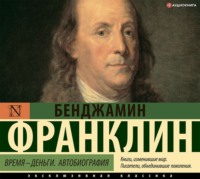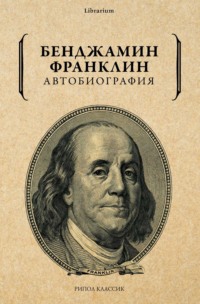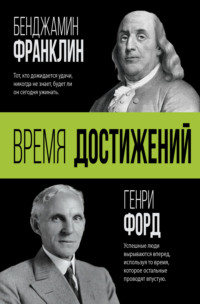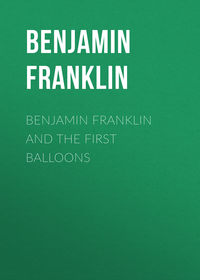![Memoirs of Benjamin Franklin; Written by Himself. [Vol. 2 of 2]](/covers_330/24858395.jpg) полная версия
полная версияMemoirs of Benjamin Franklin; Written by Himself. [Vol. 2 of 2]
"'All this is true.'
"'Tell me, then,' continued Socrates,'how strong our forces are by sea and land, and how strong are our enemies.'
"'Indeed,' said Glaucon, 'I cannot tell you on a sudden.'
"'If you have a list of them in writing, pray show it me; I should be glad to hear it read.'
"'I have it not yet.'
"'I see, then,' said Socrates, 'that we shall not engage in war so soon; for the greatness of the undertaking will hinder you from maturely weighing all the consequences of it in the beginning of your government. But,' continued he, 'you have thought of the defence of the country; you know what garrisons are necessary, and what are not; you know what number of troops is sufficient in one, and not sufficient in another; you will cause the necessary garrisons to be re-enforced, and disband those that are useless?'
"'I should be of opinion,' said Glaucon, 'to leave none of them on foot, because they ruin a country on pretence of defending it.'
"'But,' Socrates objected, 'if all the garrisons were taken away, there would be nothing to hinder the first comer from carrying off what he pleased; but how come you to know that the garrisons behave themselves so ill? Have you been upon the place? Have you seen them?'
"'Not at all; but I suspect it to be so.'
"'When, therefore, we are certain of it,' said Socrates, 'and can speak upon better grounds than simple conjectures, we will propose this advice to the senate.'
"'It may be well to do so,' said Glaucon.
"'It comes into my mind, too,' continued Socrates, 'that you have never been at the mines of silver, to examine why they bring not in so much now as they did formerly.'
"'You say true; I have never been there.'
"'Indeed, they say the place is very unhealthy, and that may excuse you.'
"'You rally me now,' said Glaucon.
"Socrates added, 'But I believe you have at least observed how much corn our land produces, how long it will serve to supply our city, and how much more we shall want for the whole year; to the end you may not be surprised with a scarcity of bread, but may give timely orders for the necessary provisions.'
"'There is a deal to do,' said Glaucon, 'if we must take care of all these things.'
"'There is so,' replied Socrates; 'and it is even impossible to manage our own families well, unless we know all that is wanting, and take care to provide it. As you see, therefore, that our city is composed of above ten thousand families, and it being a difficult task to watch over them all at once, why did you not first try to retrieve your uncle's affairs, which are running to decay? and, after having given that proof of your industry, you might have taken a greater trust upon you. But now, when you find yourself incapable of aiding a private man, how can you think of behaving yourself so as to be useful to a whole people? Ought a man, who has not strength enought to carry a hundred pound weight, to undertake to carry a heavier burden?'
"'I would have done good service to my uncle,' said Glaucon, 'if he would have taken my advice.'
"'How,' replied Socrates, 'have you not hitherto been able to govern the mind of your uncle, and do you now believe yourself able to govern the minds of all the Athenians, and his among the rest? Take heed, my dear Glaucon, take heed lest too great a desire of power should render you despised; consider how dangerous it is to speak and entertain ourselves concerning things we do not understand; what a figure do those forward and rash people make in the world who do so; and judge yourself whether they acquire more esteem than blame, whether they are more admired than contemned. Think, on the contrary, with how much more honour a man is regarded who understands perfectly what he says and what he does, and then you will confess that renown and applause have always been the recompense of true merit, and shame the reward of ignorance and temerity. If, therefore, you would be honoured, endeavour to be a man of true merit; and if you enter upon the government of the republic with a mind more sagacious than usual, I shall not wonder if you succeed in all your designs.'"
Thus Socrates put a stop to the disorderly ambition of this man; but, on an occasion quite contrary, he in the following manner exhorted Charmidas to take an employment.
"He was a man of sense, and more deserving than most others in the same post; but, as he was of a modest disposition, he constantly declined, and made great difficulties of engaging himself in public business. Socrates therefore addressed himself to him in this manner:
"'If you knew any man that could gain the prizes in the public games, and by that means render himself illustrious, and acquire glory to his country, what would you say of him if he refused to offer himself to the combat?'
"'I would say,' answered Charmidas, 'that he was a mean-spirited, effeminate fellow.'
"'And if a man were capable of governing a republic, of increasing its power by his advice, and of raising himself by this means to a high degree of honour, would you not brand him likewise with meanness of soul if he would not present himself to be employed?'
"'Perhaps I might,' said Charmidas; 'but why do you ask me this question?' Socrates replied, 'Because you are capable of managing the affairs of the republic, and nevertheless you avoid doing so, though, in quality of a citizen, you are obliged to take care of the commonwealth. Be no longer, then, thus negligent in this matter; consider your abilities and your duty with more attention, and let not slip the occasions of serving the republic, and of rendering it, if possible, more flourishing than it is. This will be a blessing whose influence will descend not only on the other citizens, but on your best friends and yourself.'"
THE WASTE OF LIFE
Anergus was a gentleman of a good estate; he was bred to no business, and could not contrive how to waste his hours agreeably; he had no relish for any of the proper works of life, nor any taste at all for the improvements of the mind; he spent, generally, ten hours of the four-and-twenty in his bed; he dozed away two or three more on his couch, and as many were dissolved in good liquor every evening, if he met with company of his own humour. Five or six of the rest he sauntered away with much indolence; the chief business of them was to contrive his meals, and to feed his fancy beforehand with the promise of a dinner and supper; not that he was so absolute a glutton or so entirely devoted to his appetite, but, chiefly because he knew not how to employ his thoughts better, he let them rove about the sustenance of his body. Thus he had made a shift to wear off ten years since the paternal estate fell into his hands; and yet, according to the abuse of words in our day, he was called a man of virtue, because he was scarce ever known to be quite drunken, nor was his nature much inclined to licentiousness.
One evening, as he was musing alone, his thoughts happened to take a most unusual turn, for they cast a glance backward, and began to reflect on his manner of life. He bethought himself what a number of living beings had been made a sacrifice to support his carcass, and how much corn and wine had been mingled with those offerings. He had not quite lost all the arithmetic that he had learned when he was a boy, and he set himself to compute what he had devoured since he came to the age of man.
"About a dozen of feathered creatures, small and great, have, one week with another," said he, "given up their lives to prolong mine, which in ten years amounts to at least six thousand.
"Fifty sheep have been sacrificed in a year, with half a hecatomb of black cattle, that I might have the choicest part offered weekly upon my table. Thus a thousand beasts out of the flock and the herd have been slain in ten years' time to feed me, besides what the forest has supplied me with. Many hundreds of fishes have, in all their varieties, been robbed of life for my repast, and of the smaller fry as many thousands.
"A measure of corn would hardly afford me fine flour enough for a month's provision, and this arises to above six score bushels; and many hogsheads of ale and wine, and other liquors, have passed through this body of mine, this wretched strainer of meat and drink.
"And what have I done all this time for God or man? What a vast profusion of good things upon a useless life and a worthless liver! There is not the meanest creature among all these which I have devoured, but hath answered the end of its creation better than I. It was made to support human nature, and it hath done so. Every crab and oyster I have ate, and every grain of corn I have devoured, hath filled up its place in the rank of beings with more propriety and honour than I have done. Oh shameful waste of life and time!"
In short, he carried on his moral reflections with so just and severe a force of reason, as constrained him to change his whole course of life, to break off his follies at once, and to apply himself to gain some useful knowledge, when he was more than thirty years of age. He lived many following years with the character of a worthy man and an excellent Christian; he performed the kind offices of a good neighbour at home, and made a shining figure as a patriot in the senate-house; he died with a peaceful conscience, and the tears of his country were dropped upon his tomb.
The world, that knew the whole series of his life, stood amazed at the mighty change. They beheld him as a wonder of reformation, while he himself confessed and adored the Divine power and mercy, which had transformed him from a brute to a man.
But this was a single instance; and we may almost venture to write MIRACLE upon it. Are there not numbers of both sexes among our young gentry, in this degenerate age, whose lives thus run to utter waste, without the least tendency to usefulness?
When I meet with persons of such a worthless character as this, it brings to my mind some scraps of Horace:
"Nos numerus sumus, et fruges consumere nati,..... Alcinoique..... juventus,Cui pulchrum fuit in medios dormire dies," &c.PARAPHRASEThere are a number of us creepInto this world, to eat and sleep;And know no reason why they're born,But merely to consume the corn,Devour the cattle, fowl, and fish,And leave behind an empty dish.Though crows and ravens do the same,Unlucky birds of hateful name,Ravens or crows might fill their places,And swallow corn and eat carcáses,Then, if their tombstone, when they die,Be n't taught to flatter and to lie.There's nothing better will be said,Than that they've eat up all their bread,Drunk all their drink, and gone to bed.SELF-DENIAL NOT THE ESSENCE OF VIRTUE
It is commonly asserted, that without self-denial there is no virtue, and that the greater the self-denial the greater the virtue.
If it were said that he who cannot deny himself anything he inclines to, though he knows it will be to his hurt, has not the virtue of resolution or fortitude, it would be intelligible enough; but, as it stands, it seems obscure or erroneous.
Let us consider some of the virtues singly.
If a man has no inclination to wrong people in his dealings, if he feels no temptation to it, and, therefore, never does it, can it be said that he is not a just man? If he is a just man, has he not the virtue of justice?
If to a certain man idle diversions have nothing in them that is tempting, and, therefore, he never relaxes his application to business for their sake, is he not an industrious man? Or has he not the virtue of industry?
I might in like manner instance in all the rest of the virtues; but, to make the thing short, as it is certain that the more we strive against the temptation to any vice, and practise the contrary virtue, the weaker will that temptation be, and the stronger will be that habit, till at length the temptation has no force or entirely vanishes; does it follow from thence that, in our endeavours to overcome vice, we grow continually less and less virtuous, till at length we have no virtue at all?
If self-denial be the essence of virtue, then it follows that the man who is naturally temperate, just, &c., is not virtuous; but that, in order to be virtuous, he must, in spite of his natural inclination, wrong his neighbours, and eat, and drink, &c., to excess.
But perhaps it may be said, that by the word virtue in the above assertion is meant merit; and so it should stand thus: Without self-denial there is no merit, and the greater the self-denial the greater the merit.
The self-denial here meant must be when our inclinations are towards vice, or else it would still be nonsense.
By merit is understood desert; and when we say a man merits, we mean that he deserves praise or reward.
We do not pretend to merit anything of God, for he is above our services; and the benefits he confers on us are the effects of his goodness and bounty.
All our merit, then, is with regard to one another, and from one to another.
Taking, then, the assertion as it last stands,
If a man does me a service from a natural benevolent inclination, does he deserve less of me than another, who does me the like kindness against his inclination?
If I have two journeymen, one naturally industrious, the other idle, but both perform a day's work equally good, ought I to give the latter the most wages?
Indeed, lazy workmen are commonly observed to be more extravagant in their demands than the industrious; for, if they have not more for their work, they cannot live as well. But though it be true to a proverb that lazy folks take the most pains, does it follow that they deserve the most money?
If you were to employ servants in affairs of trust, would you not bid more for one you knew was naturally honest than for one naturally roguish, but who has lately acted honestly? For currents, whose natural channel is dammed up till the new course is by time worn sufficiently deep and become natural, are apt to break their banks. If one servant is more valuable than another, has he not more merit than the other? and yet this is not on account of superior self-denial.
Is a patriot not praiseworthy if public spirit is natural to him?
Is a pacing-horse less valuable for being a natural pacer?
Nor, in my opinion, has any man less merit for having, in general, natural virtuous inclinations.
The truth is, that temperance, justice, charity, &c., are virtues, whether practised with or against our inclinations; and the man who practises them merits our love and esteem; and self-denial is neither good nor bad but as it is applied. He that denies a vicious inclination, is virtuous in proportion to his resolution; but the most perfect virtue is above all temptation; such as the virtue of the saints in heaven; and he who does a foolish, indecent, or wicked thing, merely because it is contrary to his inclination (like some mad enthusiasts I have read of, who ran about naked, under the notion of taking up the cross), is not practising the reasonable science of virtue, but is a lunatic.
ON THE USEFULNESS OF THE MATHEMATICS
Mathematics originally signified any kind of discipline or learning, but now it is taken for that science which teaches or contemplates whatever is capable of being numbered or measured. That part of the mathematics which relates to numbers only, is called arithmetic; and that which is concerned about measure in general, whether length, breadth, motion, force, &c., is called geometry.
As to the usefulness of arithmetic, it is well known that no business, commerce, trade, or employment whatsoever, even from the merchant to the shopkeeper, &c., can be managed and carried on without the assistance of numbers; for by these the trader computes the value of all sorts of goods that he dealeth in, does his business with ease and certainty, and informs himself how matters stand at any time with respect to men, money, and merchandise, to profit and loss, whether he goes forward or backward, grows richer or poorer. Neither is this science only useful to the merchant, but is reckoned the primum mobile (or first mover) of all mundane affairs in general, and is useful for all sorts and degrees of men, from the highest to the lowest.
As to the usefulness of geometry, it is as certain that no curious art or mechanic work can either be invented, improved, or performed without its assisting principles.
It is owing to this that astronomers are put into a way of making their observations, coming at the knowledge of the extent of the heavens, the duration of time, the motions, magnitudes, and distances of the heavenly bodies, their situations, positions, risings, settings, aspects, and eclipses; also the measure of seasons, of years, and of ages.
It is by the assistance of this science that geographers present to our view at once the magnitude and form of the whole earth, the vast extent of the seas, the divisions of empires, kingdoms, and provinces.
It is by the help of geometry the ingenious mariner is instructed how to guide a ship through the vast ocean, from one part of the earth to another, the nearest and safest way, and in the shortest time.
By help of this science the architects take their just measures for the structure of buildings, as private houses, churches, palaces, ships, fortifications, &c.
By its help engineers conduct all their works, take the situation and plan of towns, forts, and castles, measure their distances from one another, and carry their measures into places that are only accessible to the eye.
From hence also is deduced that admirable art of drawing sundials on any place, howsoever situate, and for any part of the world, to point out the exact time of the day, the sun's declination, altitude, amplitude, azimuth, and other astronomical matters.
By geometry the surveyor is directed how to draw a map of any country, to divide his lands, and to lay down and plot any piece of ground, and thereby discover the area in acres, rods, and perches; the gauger is instructed how to find the capacities or solid contents of all kinds of vessels, in barrels, gallons, bushels, &c.; and the measurer is furnished with rules for finding the areas and contents of superfices and solids, and casting up all manner of workmanship. All these, and many more useful arts, too many to be enumerated here, wholly depend upon the aforesaid sciences, namely, arithmetic and geometry.
This science is descended from the infancy of the world, the inventors of which were the first propagators of human kind, as Adam, Noah, Abraham, Moses, and divers others.
There has not been any science so much esteemed and honoured as this of the mathematics, nor with so much industry and vigilance become the care of great men, and laboured in by the potentates of the world, namely, emperors, kings, princes, &c.
Mathematical demonstrations are a logic of as much or more use than that commonly learned at schools, serving to a just formation of the mind, enlarging its capacity, and strengthening it so as to render the same capable of exact reasoning, and discerning truth from falsehood in all occurrences, even subjects not mathematical. For which reason it is said the Egyptians, Persians, and Lacedæmonians seldom elected any new kings but such as had some knowledge in the mathematics; imagining those who had not men of imperfect judgments, and unfit to rule and govern.
Though Plato's censure, that those who did not understand the 117th proposition of the 13th book of Euclid's Elements ought not to be ranked among rational creatures, was unreasonable and unjust, yet to give a man the character of universal learning, who is destitute of a competent knowledge in the mathematics, is no less so.
The usefulness of some particular parts of the mathematics, in the common affairs of human life, has rendered some knowledge of them very necessary to a great part of mankind, and very convenient to all the rest, that are any way conversant beyond the limits of their own particular callings.
Those whom necessity has obliged to get their bread by manual industry, where some degree of art is required to go along with it, and who have had some insight into these studies, have very often found advantages from them sufficient to reward the pains they were at in acquiring them. And whatever may have been imputed to some other studies, under the notion of insignificance and loss of time, yet these, I believe, never caused repentance in any, except it was for their remissness in the prosecution of them.
Philosophers do generally affirm that human knowledge to be most excellent which is conversant among the most excellent things. What science, then, can there be more noble, more excellent, more useful for men, more admirably high and demonstrative, than this of the mathematics?
I shall conclude with what Plato says, in the seventh book of his Republic, with regard to the excellence and usefulness of geometry, being to this purpose:
"Dear friend – You see, then, that mathematics are necessary, because, by the exactness of the method, we get a habit of using our minds to the best advantage. And it is remarkable that, all men being capable by nature to reason and understand the sciences, the less acute, by studying this, though useless to them in every other respect, will gain this advantage, that their minds will be improved in reasoning aright; for no study employs it more, nor makes it susceptible of attention so much; and those who we find have a mind worth cultivating, ought to apply themselves to this study."
THE ART OF PROCURING PLEASANT DREAMS
Inscribed to Miss * * * *, being written at her request
As a great part of our life is spent in sleep, during which we have sometimes pleasant and some times painful dreams, it becomes of some consequence to obtain the one kind and avoid the other, for, whether real or imaginary, pain is pain and pleasure is pleasure. If we can sleep without dreaming, it is well that painful dreams are avoided. If, while we sleep, we can have any pleasing dreams, it is, as the French say, autant de gagné, so much added to the pleasure of life.
To this end it is, in the first place, necessary to be careful in preserving health, by due exercise and great temperance; for in sickness the imagination is disturbed, and disagreeable, sometimes terrible, ideas are apt to present themselves. Exercise should precede meals, not immediately follow them; the first promotes, the latter, unless moderate, obstructs digestion. If, after exercise, we feed sparingly, the digestion will be easy and good, the body lightsome, the temper cheerful, and all the animal functions performed agreeably. Sleep, when it follows, will be natural and undisturbed; while indolence, with full feeding, occasions nightmares and horrors inexpressible; we fall from precipices, are assaulted by wild beasts, murderers, and demons, and experience every variety of distress. Observe, however, that the quantities of food and exercise are relative things; those who move much may, and, indeed, ought to, eat more; those who use little exercise should eat little. In general, mankind, since the improvement of cookery, eat about twice as much as nature requires. Suppers are not bad if we have not dined; but restless nights naturally follow hearty suppers after full dinners. Indeed, as there is a difference in constitutions, some rest well after these meals; it costs them only a frightful dream and an apoplexy, after which they sleep till doomsday. Nothing is more common in the newspapers than instances of people who, after eating a hearty supper, are found dead abed in the morning.
Another means of preserving health, to be attended to, is the having a constant supply of fresh air in your bedchamber. It has been a great mistake, the sleeping in rooms exactly closed, and in beds surrounded by curtains. No outward air that may come in to you is so unwholesome as the unchanged air, often breathed, of a close chamber. As boiling water does not grow hotter by longer boiling, if the particles that receive greater heat can escape, so living bodies do not putrefy if the particles, so fast as they become putrid, can be thrown off. Nature expels them by the pores of the skin and the lungs, and in a free, open air they are carried off; but in a close room we receive them again and again, though they become more and more corrupt. A number of persons crowded into a small room thus spoil the air in a few minutes and even render it mortal, as in the Black Hole at Calcutta. A single person is said to spoil only a gallon of air per minute, and therefore requires a longer time to spoil a bedchamber-full; but it is done, however, in proportion, and many putrid disorders hence have their origin. It is recorded of Methusalem, who, being the longest liver, may be supposed to have best preserved his health, that he slept always in the open air; for, when he had lived five hundred years, an angel said to him, "Arise, Methusalem, and build thee a house, for thou shalt live yet five hundred years longer." But Methusalem answered and said, "If I am to live but five hundred years longer, it is not worth while to build me a house; I will sleep in the air, as I have been used to do." Physicians, after having for ages contended that the sick should not be indulged with fresh air, have at length discovered that it may do them good. It is therefore to be hoped that they may in time discover likewise that it is not hurtful to those who are in health, and that we may then be cured of the aerophoba, that at present distresses weak minds, and makes them choose to be stifled and poisoned rather than leave open the window of a bedchamber or put down the glass of a coach.








![Memoirs of Benjamin Franklin; Written by Himself. [Vol. 1 of 2]](/covers_200/24858139.jpg)
